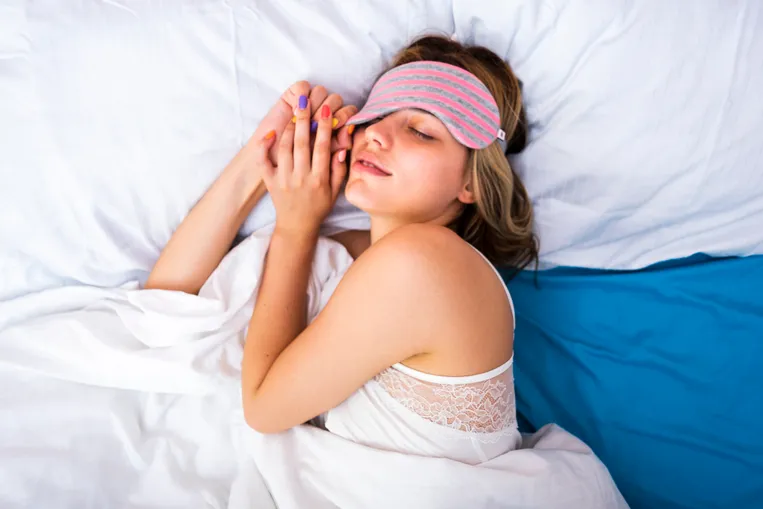
As parents, it’s easy to worry that our teens are sleeping far too much or that they only make their way out of their bedrooms in the afternoons on weekends. If this rings true to you, I urge you not to be too concerned.
We know now, thanks to recent developments in neuroscience, that during adolescence teenagers undergo extreme physiological changes which demand more sleep than the average adult. According to Dr Michael Crocetti, a pediatrician at John Hopkins Hospital, teenagers need approximately 9 to 9½ hours of sleep each night.
So why then are they sleeping during the day rather than at night? There's a physiological explanation for that one too.
The Teenage Brain is Changing
During adolescence, teenagers experience a natural shift in their circadian rhythm -- the body's internal clock, responsible for letting us know when to sleep and when to be awake. Additionally, a change in homeostatic drive occurs during this period. The homeostatic drive can be best explained as our body's 'sleep pressure'. The longer we stay awake, the more our sleep pressure increases. After sleep, our homeostatic drive returns to its baseline. Teenagers develop a natural resistance to sleep pressure which permits them to stay up later in the evening. This, paired with an imbalanced circadian rhythm, means that teens are staying up late in the evening and sleeping late in the morning (or afternoon, like I did). Research shows that the average high schooler falls asleep at approximately 11:00 pm or later.
Despite their propensity for sleep, evidence suggests that adolescents are most at risk for sleep deprivation. With most high schools in the US starting as early as 8:00 am and afternoons jam-packed with extra-curricular activities, one doesn't have to look far to understand why. With this in mind, some schools in the US have begun to introduce later start times.
Exposure to blue light from electronic devices such as cell phones, laptops, and video games is also having a negative impact on the quality of sleep. Many teens use their devices late into the night which tricks the body into thinking it is still daytime, and as a result, interferes with the natural production of melatonin - the hormone responsible for regulating our sleep cycles. Studies have shown that adolescents are extra-sensitive to blue light
Disruptions to the sleep needs of teenagers have been shown to result in poor academic performance, risk of injury, behavioral problems, mental health challenges, and an increased likelihood of substance abuse. Other health issues have also been flagged such as a weakened immune response and adverse effects on heart rate, digestion, and body temperature.
Sleeping for Learning
Research indicates that students reporting lower academic performance at high school are getting less sleep and experiencing more irregular sleep schedules than those reporting higher grades. This can not only be ascribed to sleep deprivation, but to the pivotal role that sleep plays in learning. Matthew Walker, author of Why We Sleep and Professor of Neuroscience at the University of California, has shown that sleep helps students memorize, retain, and recall information. It also assists them in using any newly acquired knowledge to create and innovate.
This has to do with, amongst other things, the concept of neuroplasticity. According to Andrew Huberman, neuroscientist and Professor at Stanford University, neuroplasticity is 'The brain's ability to modify itself in response to experience'. From birth to the age of twenty-five, the brain is most malleable and adolescence is the 'sweet spot' -- teenagers are wired to learn and their brains are maturing at a rapid pace. The catch is that sleep is incredibly important for neuroplasticity to take place and for these changes to become cemented. Huberman notes that while neuroplasticity is triggered during periods of extreme focus, it is only during sleep that it is processed and 'wired' into the brain.
In 1971, Professor Allan Rechtschaffen, a pioneer in sleep research argued that "if sleep does not serve an absolutely vital function, then it is the biggest mistake the evolutionary process ever made." The role of sleep in learning and habit formation is undisputed and it is for that reason that Coachbit prioritizes both a Morning and Evening Routine to assist students in achieving better sleep to support learning.
4 Healthy Sleep Habits For Your Teen:
The habits learned during adolescence shape the direction and quality of one's life. So intervention in unhealthy or unsustainable sleeping patterns during adolescence is important. As a parent, one can often feel helpless in this regard and the war on technology and late-night video games can feel unbeatable. There are, however, steps one can take as a parent to better support your teen to develop better habits around sleep. Here are four tips to get you started:
#1 Create a Sleep-Friendly Environment
In our curriculum, we encourage students to wind down for the evening and prepare for sleep. This, ideally, should apply to the household. Establish a set time each evening, where possible, and begin to dim the lights, turn off the television or any music, and begin putting cell phones and computers off or out of sight.
The National Sleep Foundation recommends electronic devices be avoided at least thirty minutes before bed but other research indicates that up to an hour before bed is preferable. Why not leave your phones and electronic devices in the kitchen or another room for the evening and make use of watches or old-school alarm clocks for your morning alarm?
If you adopt healthy sleep habits, it's more likely your children will too.
#2 Create a Sleep Schedule
This can sometimes be a tricky one, especially as sleep routines and times usually differ drastically on the weekend or during vacation. Helping your teen establish and maintain consistent times for sleeping and waking is, however, very important. Be sure to work with them on this to establish which activities are draining them and how their sleep schedules can be adjusted accordingly. To counteract the changes in school and vacation sleeping habits, a transition schedule can be put into place which can take from a few days to a few weeks. Planning ahead is helpful!
If you suspect signs of sleep deprivation suggest the use of a sleep diary to track sleep habits. At a later stage, if the problem persists, healthcare professionals will find these logs useful.
#3 Encourage Morning Movement
Research has shown that exercising in the morning can lead to an improved quality of sleep later in the day. In addition, getting into bright, and ideally natural, light in the morning can help regulate their circadian rhythm. Remember, how you spend your waking hours is just as important as your sleeping hours. Having breakfast outside or near a natural light source such as a window can be a helpful starting point.
#4 Educate Them
Currently, most school curriculums do not cover the importance of sleep nor do they help students understand the adjustments their bodies are undergoing and the radical changes it has on their sleep needs. This is why, at Coachbit, we not only educate our students about the importance of quality sleep but we help them develop better routines and habits around sleep.
By helping teenagers understand this, they can take greater responsibility in planning their days around their slumps. They will soon find that despite the fact that they can easily be awake until 11:00 pm, all-night study sessions are not advisable. Sometimes it's better to let them come to the conclusion themselves that the better they sleep at night, the better they feel during the day.
The Bottom Line
For both adults and children alike, sleep is pivotal to physical and mental wellbeing. There is no drug or quick fix to undo the damage that lack of sleep can cause -- no matter how many power naps or cups of coffee you think can reboot you. Sure, they can increase your concentration in the short term, but cannot do what sleep does for the more complex functions of the brain: learning, memory, focus, and emotional stability. The sooner we can understand the unique sleep needs of teenagers, the sooner we can introduce better sleep habits and set them up for success later in life.
Recommended Resources:
National Sleep Foundation Sleep and Teens Task Force. Adolescent Sleep Needs and Patterns: Research Report and Resource Guide. Washington: National Sleep Foundation; 2000. pp. 1--26.
Matthew Walker, Why We Sleep: The New Science of Sleep and Dreams
Andrew Huberman Podcast: Master your Sleep and be more Alert when Awake
How many core habits and skills is your child missing?
Take our short quiz and find out.
Take our quiz


